Understanding the Role of Your Furnace's Heat Exchanger
When you need heat exchanger repair san jose, you're dealing with one of the most critical—and potentially dangerous—furnace components. Here's what you need to know:
Quick Answer: Finding Heat Exchanger Repair in San Jose
- What it is: The heat exchanger transfers heat from combustion to your home's air while keeping dangerous gases separate.
- Why it matters: A cracked heat exchanger can leak carbon monoxide into your home.
- Signs of trouble: Unusual smells, soot, loud noises, or a yellow flickering flame.
- What to do: Turn off your furnace immediately and call a licensed HVAC technician.
- Best approach: Professional diagnosis with specialized camera equipment and combustion testing.
A heat exchanger is the metal chamber inside your furnace where combustion warms the air for your home. It's designed to keep toxic gases—including carbon monoxide—safely contained and vented outside. When this component cracks or corrodes, that barrier fails.
The stakes are high. According to the CDC, carbon monoxide poisoning sends thousands of people to emergency rooms each year, with many cases traced to faulty heating equipment. In San Jose, furnaces face constant thermal stress from heating and cooling cycles, increasing wear on the heat exchanger.
The good news is that trained technicians can identify problems early. While some cracks can be repaired with specialized welding, replacement is often the safer long-term solution, especially for older systems.
About the Author
I'm Tony Lara, and in my HVAC career, I've handled countless heat exchanger issues. I've helped San Jose families understand their options for heat exchanger repair san jose, seeing how quick professional response prevents dangerous situations and keeps homes safe.
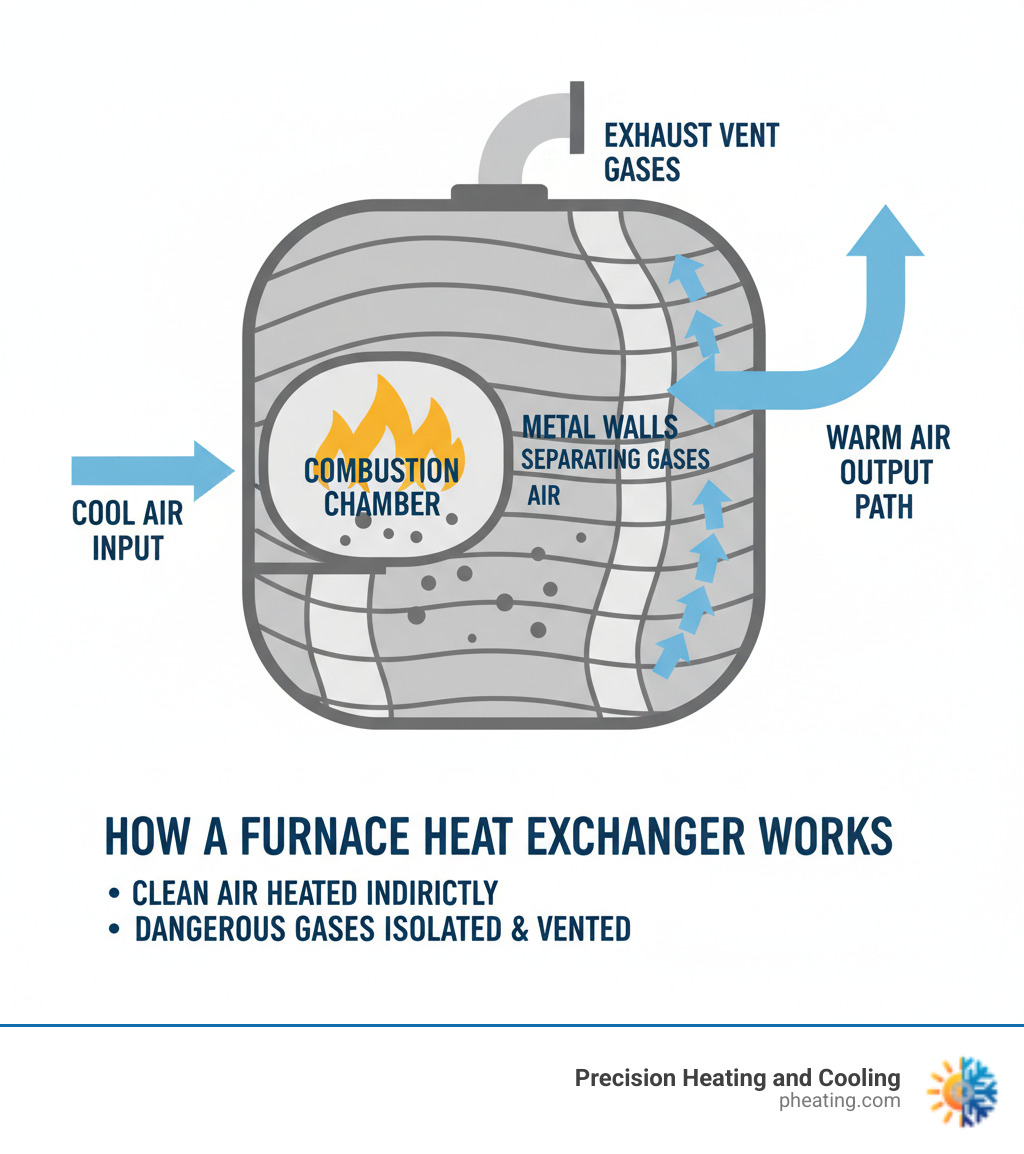
Quick heat exchanger repair san jose definitions:
Telltale Signs Your Heat Exchanger Needs Repair
Your furnace often provides warning signs when the heat exchanger is failing. Recognizing these signals is key to preventing a safety emergency.
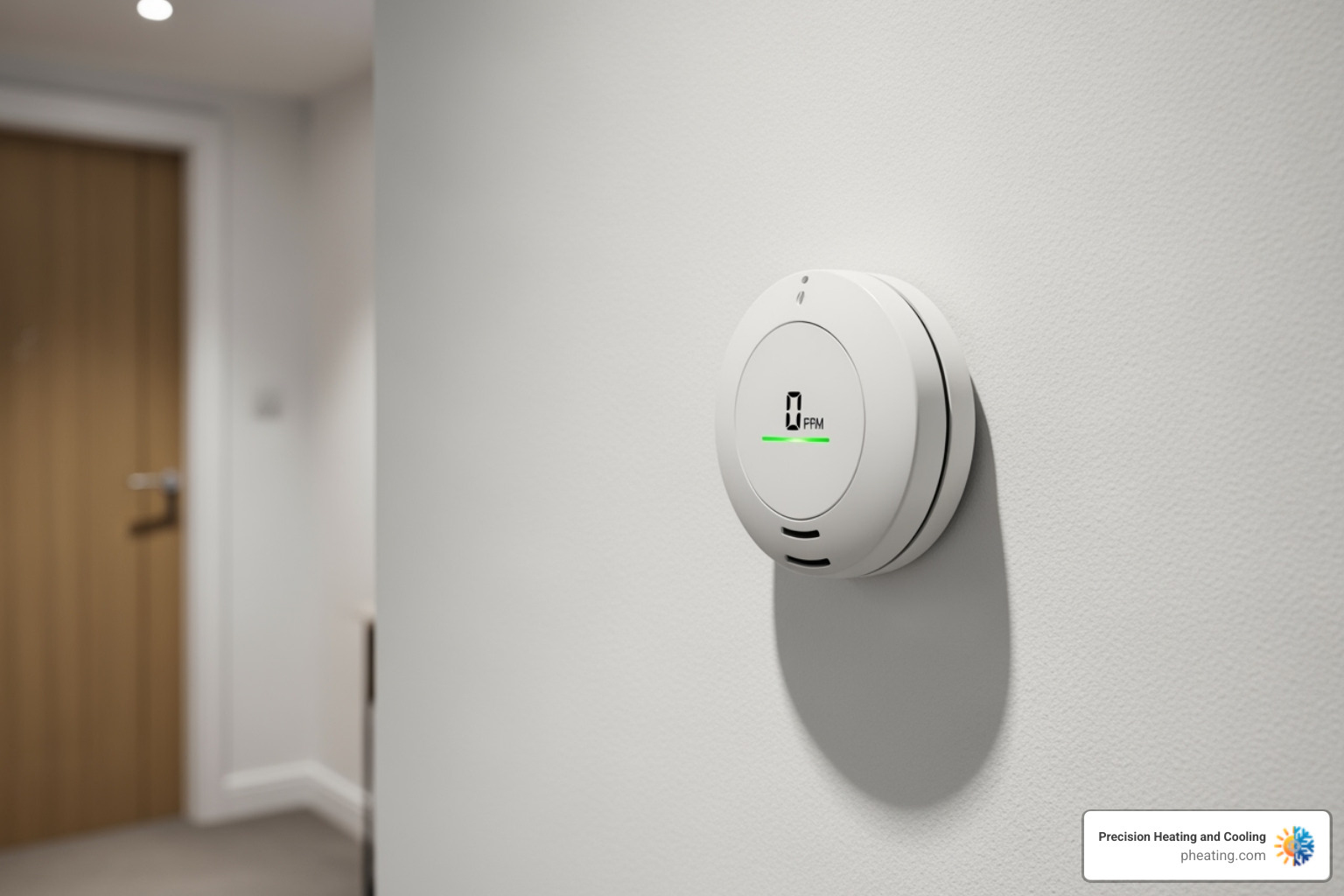
- Unusual smells: A burning, metallic, or formaldehyde-like odor when the heat is on can indicate that combustion byproducts are escaping through a crack.
- Soot or black residue: Dark buildup near the burner area is a red flag for incomplete combustion, meaning harmful gases may be leaking.
- Visible cracks or corrosion: While not always easy to see without professional tools, any visible rust, pitting, or cracks on the heat exchanger are serious.
- Loud noises: Banging, popping, or rattling sounds can signal that the metal is under stress from abnormal expansion and contraction.
- Changes in flame appearance: A healthy burner flame is steady and blue. A flickering, yellow, or wavering flame points to combustion problems.
- Water pooling around the furnace: In high-efficiency units, this can indicate condensation issues within the heat exchanger.
For a deeper dive into identifying these critical issues, check out our detailed guide on heat exchanger cracks.
The Dangers of a Faulty Heat Exchanger
Ignoring a damaged heat exchanger is a safety risk. The primary concern is carbon monoxide poisoning. This colorless, odorless gas can leak into your home, causing headaches, dizziness, and flu-like symptoms. Prolonged exposure can be fatal. Other risks include fire hazards from escaping hot gases and reduced system efficiency, which leads to higher energy bills as your furnace works harder to heat your home.
Common Heat Exchanger Types in San Jose
Understanding your system helps with diagnosis. Most San Jose homes use residential gas furnaces with steel or aluminum heat exchangers. Larger buildings may have commercial boilers with robust shell and tube or compact plate and frame designs. Modern high-efficiency condensing units are also common, which extract more heat but produce acidic condensate that can cause corrosion if not managed. The constant heating and cooling cycles in San Jose's climate put stress on all types, making professional heat exchanger repair san jose and regular maintenance essential.
Your Guide to Heat Exchanger Repair in San Jose
When it comes to heat exchangers, DIY repairs are not an option due to the serious risks involved, including carbon monoxide exposure. This is a job for professionals. At Precision Heating and Cooling, we have over two decades of experience with heat exchanger repair san jose, and our approach always puts your safety first.
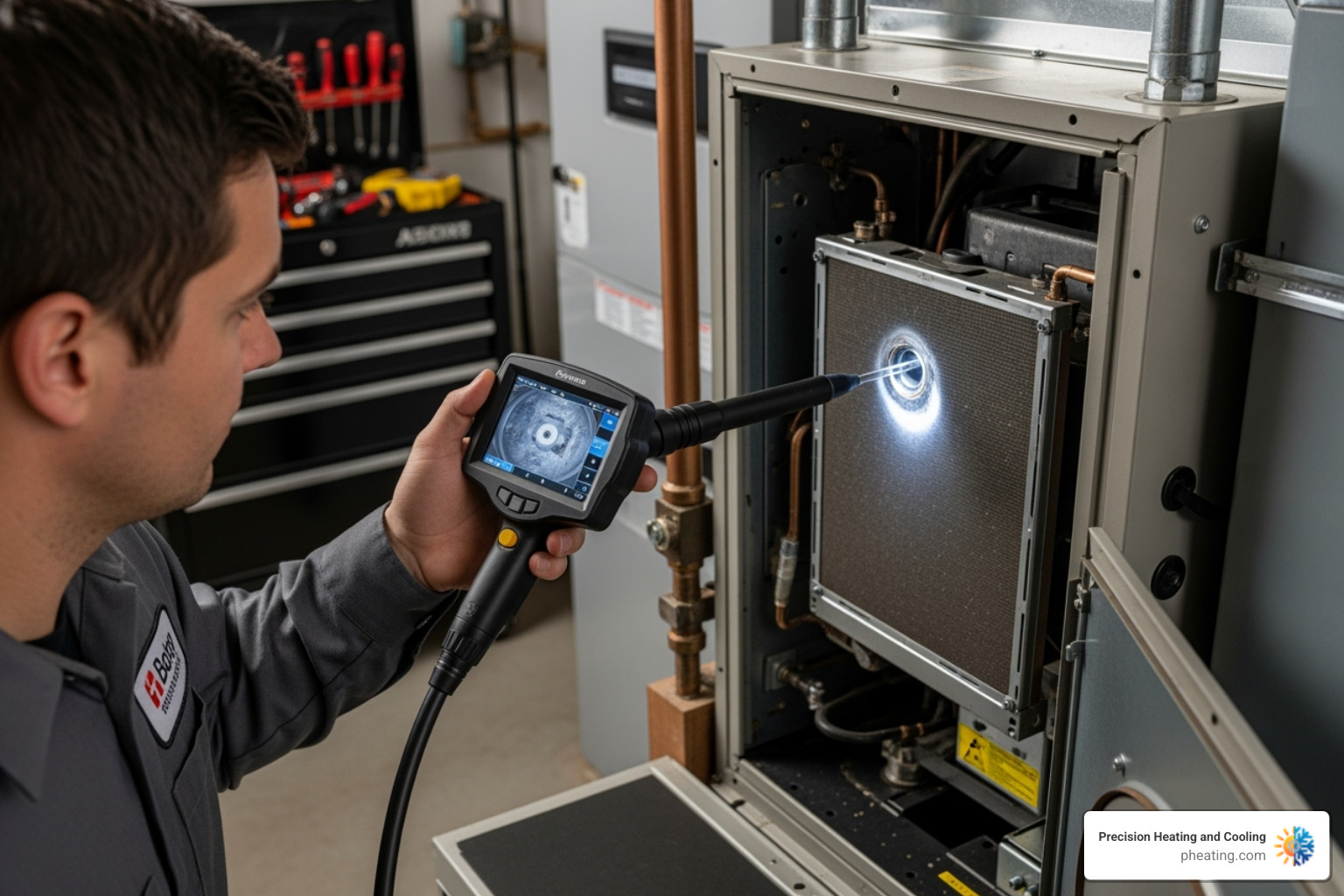
Professional Diagnosis and Repair Process
Diagnosing a heat exchanger requires more than a visual check. Our NATE-certified technicians use specialized tools to ensure accuracy and safety.
- Inspection: We use a high-definition camera scope to inspect the interior of the heat exchanger for hairline cracks and corrosion that are invisible to the naked eye.
- Analysis: Combustion analysis measures the gases exiting your furnace to detect dangerous leaks and inefficiencies.
- Safety Shutdown: Before any work begins, we safely shut down the furnace and its fuel supply.
- Repair or Seal: For certain types of damage, specialized welding or sealing can restore the heat exchanger's integrity. We only recommend repairs that are safe and durable.
- Testing: After the repair, we conduct thorough system testing and another round of combustion analysis to verify safe operation and confirm that no harmful gases are escaping.
For more information about our comprehensive approach to furnace issues, visit our Furnace Repair San Jose page.
Repair vs. Replacement: Making the Right Choice
Deciding whether to repair your heat exchanger or replace the entire furnace depends on several factors:
- Age of the furnace: Investing in a major repair for a furnace over 15 years old may not be cost-effective compared to upgrading to a new, more efficient model.
- Extent of the damage: A single, isolated crack might be repairable. Widespread corrosion or multiple cracks usually make replacement the safer option.
- Warranty: A valid warranty can make repair a more attractive option.
- Long-term reliability and efficiency: A new furnace offers greater peace of mind and significant energy savings compared to an older, repaired unit.
We'll help you weigh these factors to make an informed decision that best suits your home and budget.
For a broader perspective on HVAC repair decisions, check out our HVAC Repair San Jose page.
How to Find a Reliable and Experienced Service
Choosing the right HVAC company for heat exchanger repair san jose is crucial for your family's safety. You need technicians who take every precaution seriously.
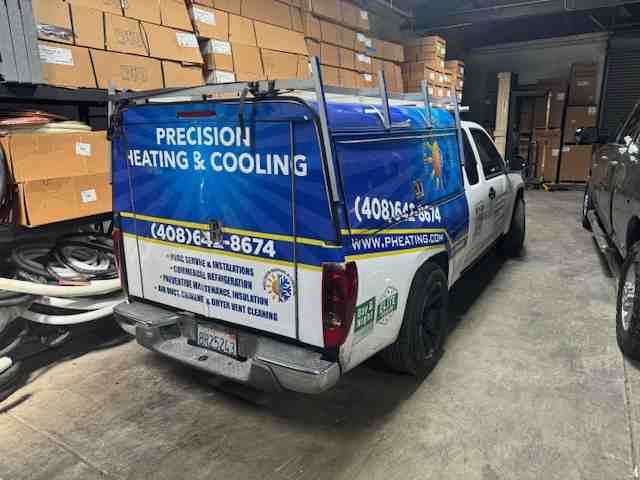
What to Look For in an HVAC Company
- Qualifications and Experience: Look for a company with extensive local experience. Always verify licenses and insurance. Check customer reviews to gauge professionalism and reliability.
- Specialized Knowledge: Ask about their specific experience with heat exchangers, the diagnostic methods they use (like camera inspections and combustion analysis), and if their technicians hold professional certifications like NATE.
- Customer Service: Inquire about warranties on repairs, emergency service availability, and their commitment to safety standards.
Why Professional Repair is Crucial
Heat exchanger repair is never a DIY project. The safety risks of DIY attempts, including carbon monoxide exposure, are severe. Professionals use specialized equipment that homeowners don't have, ensure all work is up to code compliance, and protect your furnace warranty, which is often voided by unauthorized repairs.
At Precision Heating and Cooling, our NATE-certified technicians have the expertise and tools that heat exchanger work demands. We understand that your family's safety depends on getting this right the first time.
To learn more about what sets reliable HVAC companies apart, visit our page on finding an HVAC Company in San Jose.
Preventing Future Problems with Regular Maintenance
Regular maintenance is the most effective way to prevent serious heat exchanger problems. Just like a car, your furnace runs better and lasts longer with routine care. This preventative approach is key to avoiding costly and dangerous failures.
Benefits of Regular Maintenance
- Extends equipment lifespan: A well-maintained heat exchanger can last 15-20 years or more.
- Improves energy efficiency: A clean, smooth-running system uses less fuel, lowering your utility bills.
- Catches issues early: Technicians can spot early signs of corrosion or stress cracks before they become major problems.
For general information on maintaining your heating system, visit Precision Heating and Cooling.
What a Professional Tune-Up Includes
A comprehensive furnace tune-up is a detailed process to optimize performance and safety. Our technicians will:
- Clean key components like burners and flame sensors.
- Inspect the heat exchanger for wear, cracks, or rust, often using a camera scope.
- Check electrical connections and test all safety controls.
- Lubricate moving parts like blower motors.
- Replace the air filter to ensure proper airflow.
- Verify thermostat accuracy.
We recommend scheduling professional servicing twice a year to prevent breakdowns and keep your system running efficiently. Regular maintenance is the best strategy to avoid needing heat exchanger repair san jose.
For more details on our preventative services, visit our Furnace Tune-Up San Jose page.
Frequently Asked Questions about Heat Exchanger Repair
Here are answers to the most common questions we hear from San Jose homeowners about heat exchangers.
How long does a heat exchanger last?
A typical heat exchanger can last 15-20 years or more, but its lifespan depends on factors like regular maintenance, system usage, and local conditions in San Jose. Consistent professional tune-ups are the best way to maximize its operational life.
Can a cracked heat exchanger be repaired?
Sometimes, but not always. A small, single crack in a newer unit might be repairable with specialized welding. However, for older furnaces, multiple cracks, or widespread corrosion, replacement is the safer and more reliable long-term solution. Our technicians will assess the damage and recommend the safest option for your home when you need heat exchanger repair san jose.
For more details, visit our page on heat exchanger cracks.
Is a cracked heat exchanger an emergency?
Yes, absolutely. A cracked heat exchanger can leak deadly, odorless carbon monoxide into your home. If you suspect a crack (due to unusual smells, a yellow flame, or your CO alarm), you must act immediately:
- Turn off your furnace.
- Ventilate your home by opening windows.
- Call a professional for an emergency inspection.
Do not operate the furnace until it has been inspected and cleared by a professional. For immediate assistance, visit our heating repair page.
Your Partner for Safe and Reliable Heating
Your furnace's heat exchanger is vital for your family's safety and comfort. Recognizing the warning signs of a crack and acting quickly is essential to prevent dangerous carbon monoxide leaks and ensure your system runs efficiently. Regular maintenance is the best way to catch issues early and extend your furnace's lifespan.
At Precision Heating and Cooling, we have over two decades of experience serving San Jose Bay Area families. Our NATE-certified technicians have the advanced tools and expertise to handle heat exchanger repair san jose safely and effectively. We provide reliable, lasting solutions to protect your home.
Whether you've noticed concerning warning signs or need a routine inspection, don't wait for a small problem to become a dangerous emergency. Your family's comfort and safety are our top priorities.
Schedule your professional heating repair in San Jose today and experience the peace of mind that comes with expert service.

Flexible payment options to make your goals affordable and stress-free.
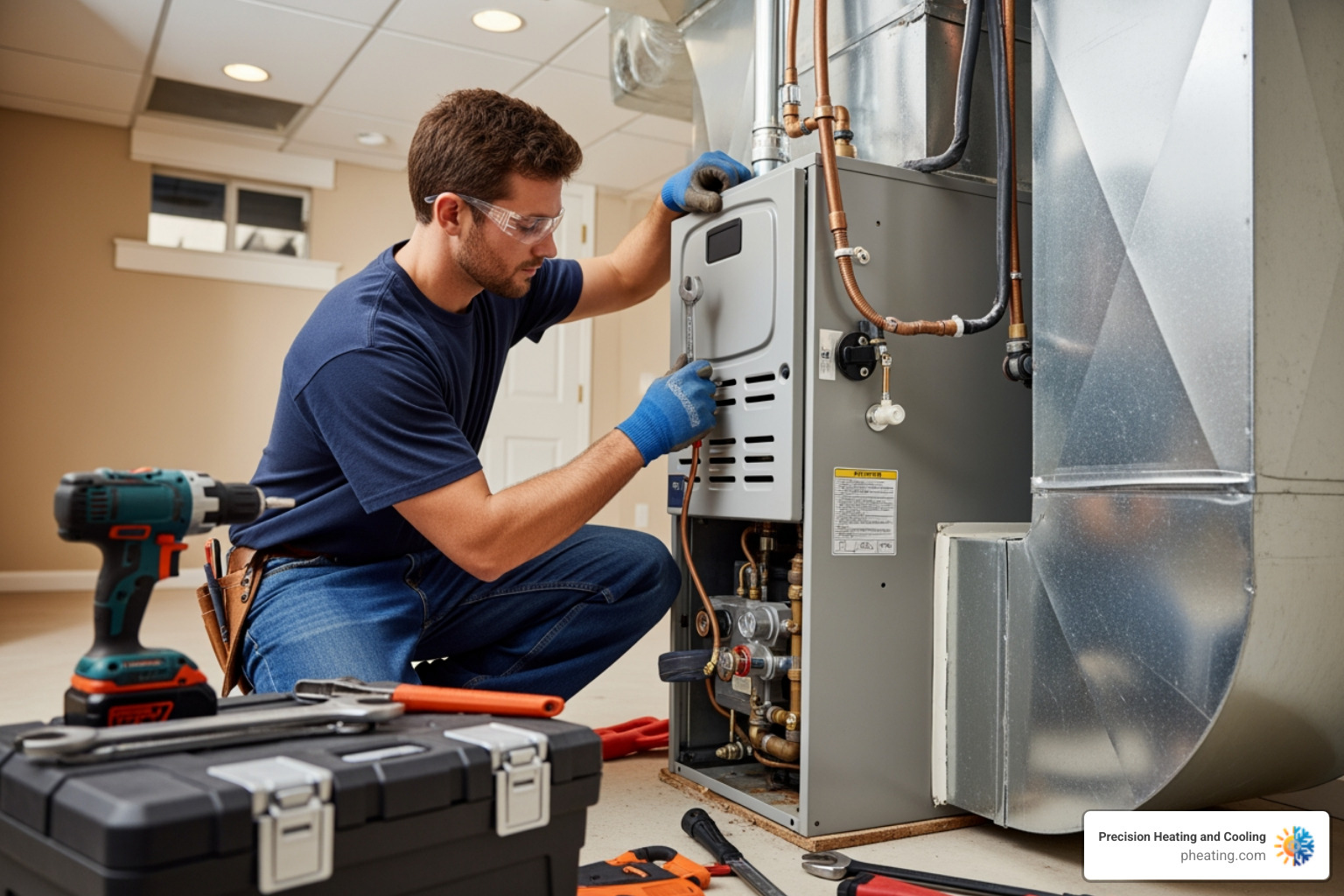
Seamless Heater Installation in Clovis, CA: A Local's Handbook

Cool Comfort, Warm Savings: A Local's Guide to Heat Pump Installation in Los Gatos
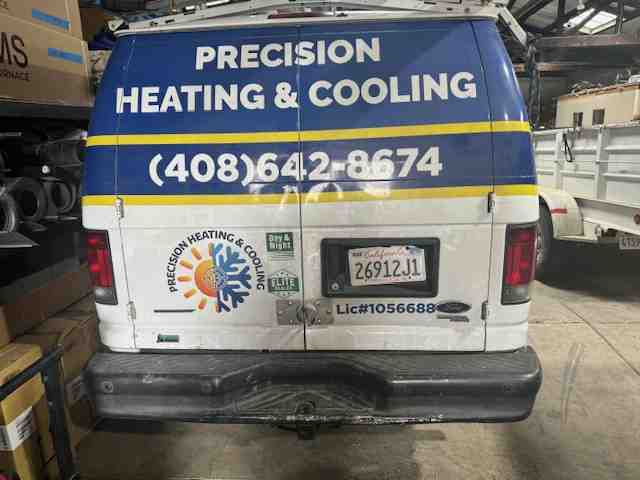












.avif)

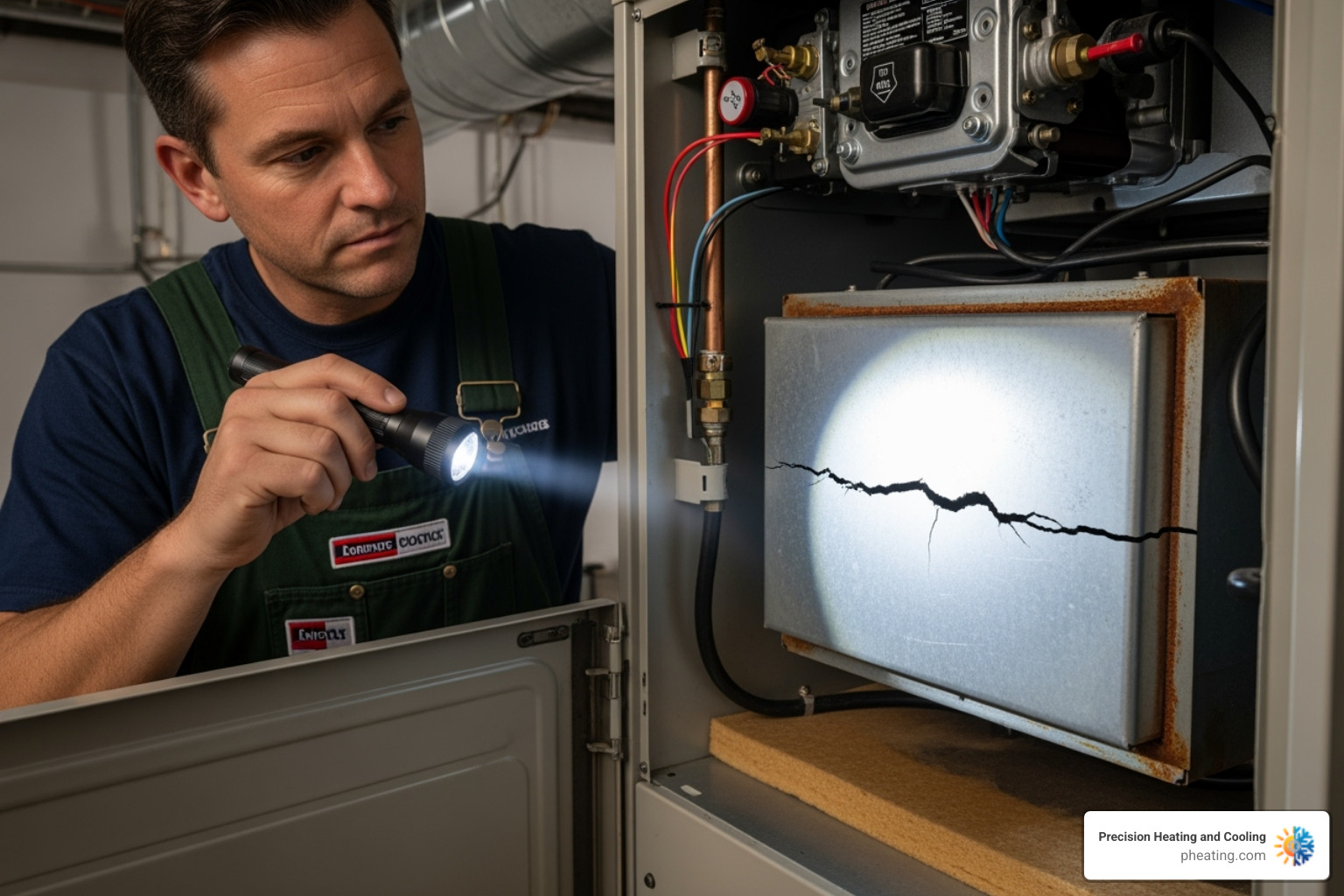








.avif)